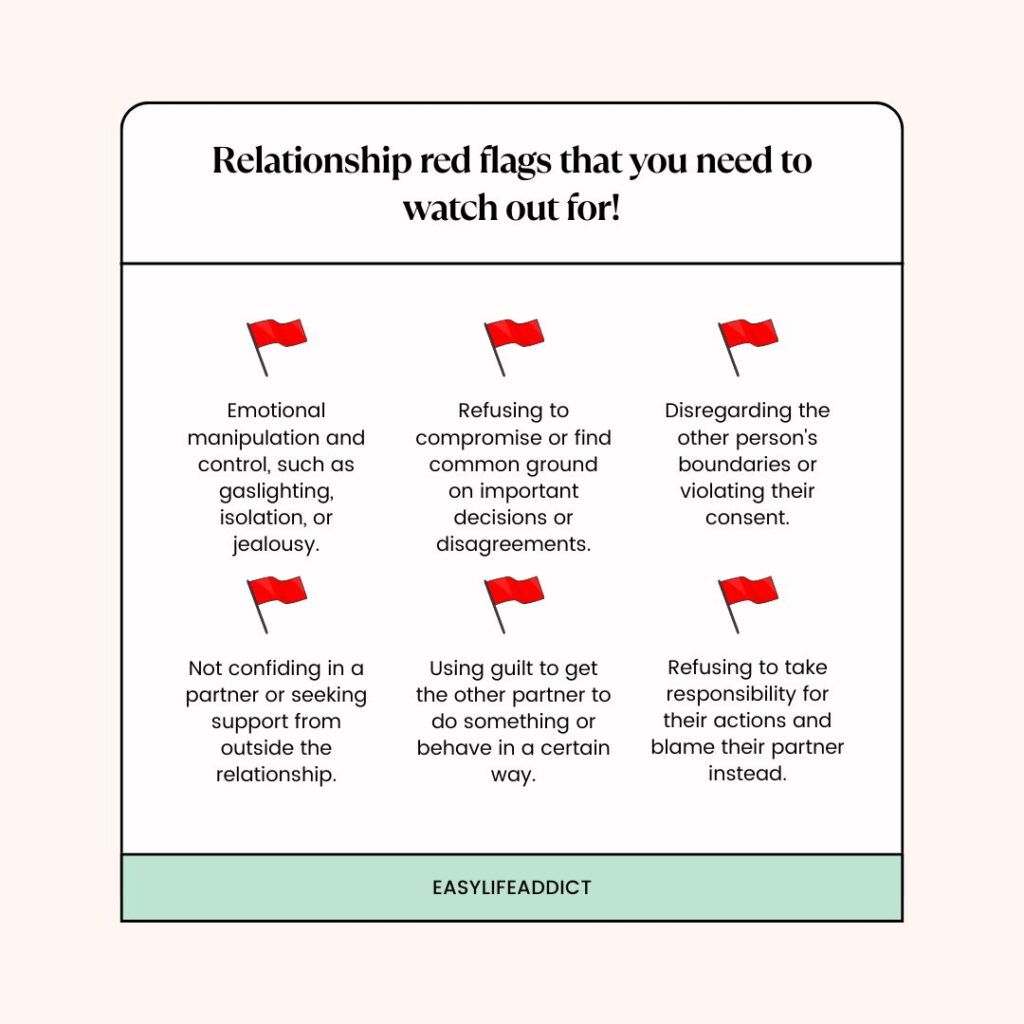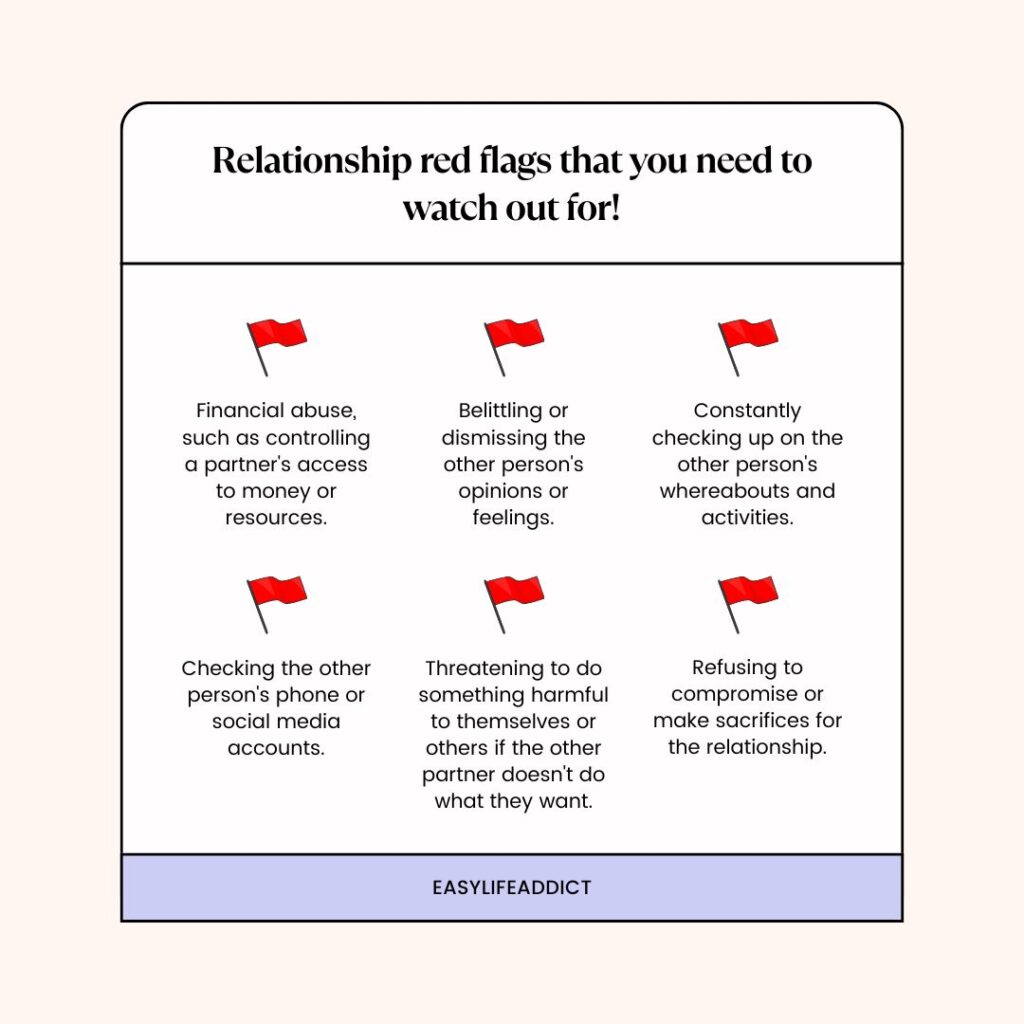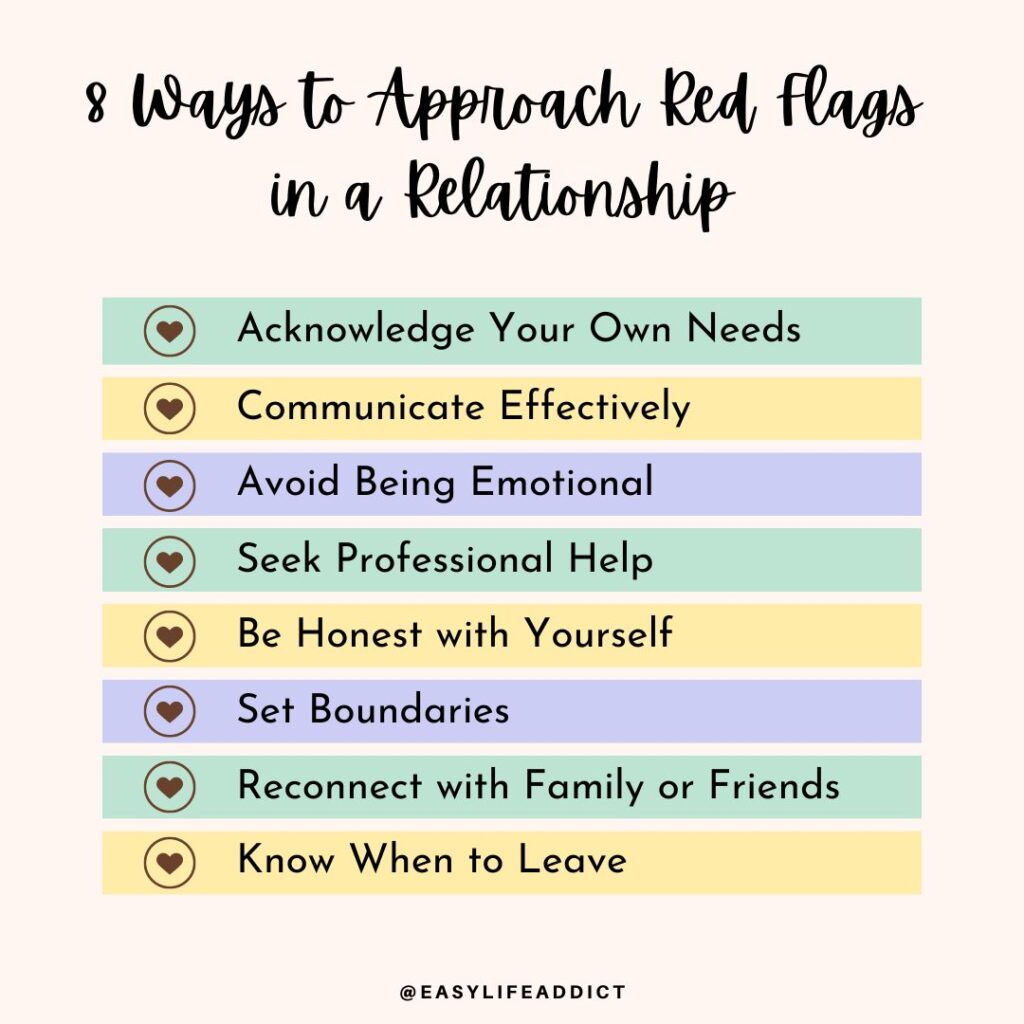15 Relationship Red Flags You Should Never Ignore!
Every relationship has ups and downs, but certain behaviours or situations can sometimes serve as red flags. These red flags are warning signs that something may be amiss in your relationship. Paying attention to these signs and addressing them early on is essential to ensure a healthy and fulfilling partnership. In this article, we will discuss 15 relationship red flags and what to do about them!
This post may contain affiliate links. That means if you click on a link and purchase something I recommend, I will receive a small commission at no extra cost. As an Amazon Associate, I earn from qualifying purchases. This helps keep my website up and running and is very appreciated. Thank you for your support! You can read my full disclosure policy here.
What are Relationship Red Flags?
In any romantic relationship, it’s important to be aware of any potential issues that may arise. Relationship red flags are those warning signs that should not be ignored, as they can indicate something is not quite right in the relationship. These red flags can take various forms, such as constant arguments, lack of communication, controlling behaviour, or being unable to resolve conflicts healthily.
Paying attention to these red flags is crucial, as they may signify potential problems or unhealthy dynamics within the relationship. Whether the issues stem from one partner’s behaviour or problems within the relationship as a whole, it’s essential to address them early on. Awareness of these signs allows for early intervention and the opportunity to work on any issues that may arise.
Ignoring these red flags may lead to more significant problems down the line, such as resentment, mistrust, or even a breakdown of the relationship. Therefore, it’s essential to be honest with yourself and your partner about your concerns and work together to address them. Ultimately, a healthy and happy relationship requires open communication, mutual respect, and a willingness to work through any challenges that may arise.
15 Relationship Red Flags:

1. Mental or Physical Abuse
Mental or physical abuse should never be ignored in a relationship and is a major red flag that indicates a toxic and unhealthy dynamic. Abuse can manifest in various forms, such as verbal insults, threats, controlling behaviour, or physical violence. These actions not only harm the victim’s self-esteem and emotional well-being but also pose serious risks to their physical safety. It is crucial to recognise these warning signs and prioritise one’s own safety and well-being. No one deserves to be mistreated or live in fear within a relationship.
Things to look out for include:
- Physical violence, such as hitting, slapping, choking, or pushing.
- Emotional manipulation and control, such as gaslighting, isolation, or jealousy.
- Sexual coercion or assault, such as forcing or pressuring a partner into sexual acts.
- Verbal abuse, such as name-calling, insults, or threats.
- Financial abuse, such as controlling a partner’s access to money or resources.
If you do find yourself in an abusive relationship, it’s important to remember that you deserve to be treated with respect and kindness. Seek help from a trusted friend, family member, or professional. Many organisations can provide support and resources for people experiencing abuse. Remember that leaving an abusive relationship can be difficult and dangerous, so it’s important to have a safety plan in place. Don’t hesitate to reach out for help!
2. Lack of Communication
Healthy communication is the foundation of any successful relationship. When communication is lacking, it becomes challenging to understand each other’s needs, concerns, and desires. It can lead to misunderstandings, unresolved conflicts, and a growing sense of distance. Without open and honest communication, trust can erode, intimacy can suffer, and the relationship may stagnate. Therefore, addressing and prioritising communication in relationships is crucial to fostering understanding, connection, and mutual growth.
Things to look out for include:
- Avoiding conversations about important topics or issues.
- Not listening or paying attention when the other person is talking.
- Assuming the other person knows what you are thinking or feeling without expressing it.
- Making assumptions about the other person’s intentions or actions without clarifying them.
- Refusing to compromise or find common ground on important decisions or disagreements.
3. Disrespectful Behavior
Disrespectful behaviour is a significant relationship red flag. It can come in various forms, such as belittling, name-calling, or dismissive attitudes. When one partner consistently disrespects the other, it creates an unhealthy dynamic where one person’s feelings and worth are undermined. This behaviour erodes trust, communication, and emotional connection, making it difficult for a relationship to thrive. Addressing and confronting disrespectful behaviour early on is vital to maintaining a healthy and balanced relationship built on mutual respect and understanding.
Things to look out for include:
- Insulting or mocking the other person.
- Belittling or dismissing the other person’s opinions or feelings.
- Using physical or emotional manipulation to control the other person.
- Withholding affection or intimacy as a way to punish your partner.
- Disregarding the other person’s boundaries or violating their consent.
4. Controlling Tendencies
While it’s natural for partners to have preferences and boundaries, excessive control can be detrimental. It’s essential to look out for signs of possessiveness, jealousy, and the need for constant monitoring. When one person tries to control every aspect of their partner’s life, it can lead to feelings of suffocation and a loss of personal freedom. Healthy relationships thrive on trust, communication, and mutual respect. If you notice these red flags, addressing them and seeking professional help is crucial. Remember, a loving relationship should empower both individuals to grow and flourish.
Things to look out for include:
- Constantly checking up on the other person’s whereabouts and activities.
- Making decisions without consulting the other person or disregarding their opinions.
- Criticising the other person’s behaviour, interests, or appearance.
- Using intimidation or threats to get the other person to comply with their wishes.
- They refuse to admit fault or take responsibility for their actions while blaming others for everything that goes wrong.
5. Lack of Trust
A lack of trust is one of the most concerning relationship red flags. Trust forms the foundation of any healthy and strong relationship; without it, the relationship can suffer. When trust is absent, doubts and insecurities can creep in, leading to resentment, misunderstandings, and constant questioning. This lack of trust can create a toxic environment where honesty and open communication become difficult. It is essential to address trust issues early on and work towards building a solid foundation of trust to ensure a healthy and fulfilling relationship.
Things to look out for include:
- Lying about important matters.
- Being secretive and hiding things from a partner.
- Constantly checking the other person’s phone or social media accounts.
- Not following through on promises made.
- Not confiding in a partner or seeking support from outside the relationship.
6. Dishonesty
When trust is compromised and lies unravel, it can erode the foundation of any healthy relationship. Honesty is the key to building a solid and lasting bond with your partner. It creates a safe space where individuals can express themselves openly and authentically. Without honesty, communication becomes strained, and doubts begin to fester. In the long run, dishonesty can lead to feelings of betrayal and resentment, ultimately damaging the relationship beyond repair. Remember, trust is the backbone of any successful partnership, so always be wary of any signs of dishonesty.
Things to look out for include:
- Lying about one’s whereabouts or actions.
- Hiding financial information or spending habits.
- Cheating or having an affair.
- Withholding important information or secrets.
- Making promises that are not kept or breaking commitments.
7. Emotional Manipulation
Emotional manipulation can be a significant red flag in any relationship. It involves one person trying to control or manipulate their partner’s emotions, thoughts, or behaviours. This can manifest in various ways, such as guilt-tripping, gaslighting, or playing mind games. These actions erode trust, breed insecurity, and create an unhealthy power dynamic. They hinder open communication, emotional intimacy, and mutual respect. In a healthy relationship, both partners should feel heard, supported, and valued. Recognising and addressing these red flags is crucial to fostering a healthy, fulfilling, and respectful connection.
Things to look out for include:
- Using guilt to get the other partner to do something or behave in a certain way.
- Manipulating the other partner into questioning their own sanity or perception of reality.
- Using silence as a way to punish or manipulate the other partner.
- Threatening to do something harmful to themselves or others if the other partner doesn’t do what they want.
- They may overwhelm the other with love and affection at the beginning of the relationship, but once the relationship is established, they may withdraw affection and become controlling.
8. Constant Criticism
Constant criticism is a major relationship red flag. It can slowly erode the foundation of trust and love upon which a relationship is built. When one partner constantly criticises the other, it creates an unhealthy dynamic where one person feels constantly judged and belittled. This can lead to resentment, low self-esteem, and a breakdown in communication. In a healthy relationship, constructive feedback is essential, but constant criticism is harmful and can indicate more profound issues that must be addressed.
Things to look out for include:
- Criticising the way a partner dresses or looks on a regular basis.
- Criticising a partner’s career or job performance, even when they are doing their best.
- Criticising a partner’s cooking or cleaning skills instead of appreciating their effort.
- Criticising a partner’s friends or family members, even when they have done nothing wrong.
- Criticising a partner for their hobbies or interests instead of supporting their passions.

9. Lack of Equality
It is crucial for partners to understand and relate to each other’s feelings and experiences. When empathy is absent, communication becomes strained, and misunderstandings arise. Without empathy, one partner may dismiss or invalidate the other’s emotions, leading to feelings of neglect and resentment. This lack of understanding can erode trust and intimacy over time, damaging the foundation of a healthy relationship. Recognising and addressing this red flag early ensures a nurturing and supportive partnership.
Things to look out for include:
- When one partner always makes any decisions without consulting the other.
- When one partner constantly puts down or belittles the other.
- When one partner is always getting their way in arguments or disagreements.
- When one partner controls the finances without giving the other a say.
- When one partner expects the other to do all the household chores without contributing equally.
10. Lack of Support
In a healthy relationship, support is crucial for both partners to thrive. Lack of support can be a significant red flag that should not be ignored. When one partner consistently dismisses or belittles the other’s dreams, goals, or emotions, it creates a toxic dynamic. This lack of support can lead to feelings of resentment, lack of self-esteem, and a breakdown in communication. Without a supportive foundation, the relationship may struggle to grow and flourish.
Things to look out for include:
- Disregarding your emotional needs and not providing comfort or empathy.
- Not being present when you need them, physically or emotionally.
- Not supporting decisions or goals and actively working against them.
- They refuse to take responsibility for their actions and blame their partner.
- Ignoring or dismissing concerns and feelings.
11. Constant Blame
Constant blame in a relationship is detrimental. It creates an unhealthy dynamic of defensiveness and resentment. Trust is eroded when one partner consistently blames the other for every issue or problem, and the environment becomes toxic. Open communication and understanding are essential in a healthy relationship, but constant blame prevents this from happening.
Things to look out for include:
- Whenever there is an argument, one partner always blames the other for starting it.
- One partner always blames the other for every little mistake or error.
- One partner blames the other for not being attentive or caring enough.
- One partner blames the other for not being successful or ambitious enough.
- One partner blames the other for not doing enough to keep the relationship interesting or exciting.
12. Lack of Intimacy
Intimacy is vital to a healthy and fulfilling connection with your partner. When there is a lack of emotional, physical, or sexual closeness, it can lead to feelings of disconnection, resentment, and dissatisfaction. Addressing and discussing this issue with your partner is crucial to understanding each other’s needs and finding ways to nurture intimacy. Ignoring or neglecting intimacy can ultimately damage the bond between partners and hinder their overall happiness and fulfilment.
Things to look out for include:
- Lack of physical touch or affection.
- Infrequent or no sexual activity.
- Limited communication or emotional connection.
- Lack of quality time spent together.
- A general feeling of distance or disconnect in the relationship.
13. Unresolved Conflicts
Unresolved conflicts in a relationship can be major red flags that shouldn’t be ignored. If left unaddressed, these conflicts can slowly erode the foundation of trust and love between partners. Communication breakdowns, constant arguments, and a lack of willingness to compromise are signs of deeper underlying issues. Ignoring these red flags can lead to a toxic and unhealthy relationship where both partners feel unheard and unfulfilled.
Things to look out for include:
- Communication breakdowns or misunderstandings.
- Trust issues or betrayals.
- Differences in values, beliefs, or goals.
- Power struggles or control issues.
- Unresolved past traumas or hurt feelings.
14. Lack of Effort
Relationships require both partners’ ongoing commitment, communication, and effort to thrive. When one person consistently shows a lack of effort, it can lead to feelings of neglect, frustration, and even resentment. Both partners must invest time, energy, and attention into the relationship to ensure its health and longevity. Without effort, the bond between partners can weaken, trust can erode, and the overall happiness and satisfaction within the relationship can suffer. It’s essential to address and communicate any signs of lacking effort early on to prevent further damage and work towards a healthier partnership.
Things to look out for include:
- Not initiating communication or making plans.
- Being consistently late or cancelling plans frequently.
- Not showing affection or appreciation.
- Neglecting to listen or show interest in the other person’s life.
- Refusing to compromise or make sacrifices for the relationship.
15. Different Goals and Aspirations
Having different goals and aspirations in a relationship can be detrimental. Being on the same page regarding what you both want for the future is essential. If one person dreams of settling down and starting a family while the other is focused on their career and travelling the world, it can create a significant divide. This mismatch in long-term goals can lead to frustration, resentment, and, ultimately, the unravelling of the relationship. It’s crucial to have open and honest conversations early on to ensure you’re aligned in your future aspirations.
Things to look out for include:
- One partner wants to settle down and start a family, while the other wants to focus on their career and travel the world.
- One partner wants to save money and plan for the future, while the other wants to live in the moment and enjoy their money now.
- One partner is committed to a healthy lifestyle and wants their partner to join them in their pursuits. In contrast, the other partner is indifferent or even resistant to lifestyle changes.
- One partner wants to prioritise spending time with their family and friends, while the other partner is more of a homebody and prefers to spend most of their time at home.
- One partner wants to take the next step in the relationship and get engaged or married, while the other is not yet ready for that level of commitment.
How to Approach Red Flags in a Relationship
If you notice any warning signs or red flags in your relationship, you must address them immediately by communicating openly and honestly with your partner. Ignoring or dismissing these signs can lead to more significant problems later on. Here are eight ways to approach the situation when encountering any red flags in your relationship.

Acknowledge Your Own Needs
The first step in addressing red flags in a relationship is acknowledging your own needs. It’s important to understand what you want and need from a relationship and recognise when those needs are not being met. Take some time to reflect on your values, desires, and expectations and consider whether the current relationship aligns with them.
Communicate Effectively
Effective communication is crucial when addressing red flags in a relationship. It’s important to express your concerns, feelings and needs to your partner clearly and respectfully. Avoid blaming or criticising your partner; instead, focus on expressing how their actions or behaviours are affecting you. Use “I” statements to communicate your own experiences and emotions, and listen actively to your partner’s perspective.
Avoid Being Emotional
When addressing red flags, it’s important to approach the conversation with a calm and rational mindset. Avoid letting your emotions take control, as this can lead to arguments or misunderstandings. Take some time to process your feelings before discussing the red flags with your partner. This will allow you to approach the conversation more constructively.
Seek Professional Help
If the red flags in your relationship are causing significant distress or you are finding it difficult to address them on your own, consider seeking professional help. A relationship counsellor or therapist can provide guidance and support in navigating the challenges you’re facing. They can also help you and your partner develop healthier communication patterns and resolve any underlying issues.
Be Honest with Yourself
When addressing red flags in a relationship, being honest with yourself is essential. Take a step back and evaluate the situation objectively. Ask yourself if the red flags are something you can live with or if they are deal-breakers. It’s important to prioritise your well-being and happiness, which sometimes means making difficult decisions.
Set Boundaries
Setting boundaries is essential when addressing red flags in a relationship. Boundaries help define what is acceptable and what is not in a relationship and protect your emotional and physical well-being. Communicate your boundaries to your partner and be firm in enforcing them. If your partner repeatedly crosses your boundaries, it may be a sign that the relationship has run its course.
Reconnect with Family or Friends
When dealing with red flags in a relationship, it can be helpful to reconnect with your support system. Reach out to family or friends who can provide a listening ear, advice, and perspective. Surrounding yourself with loved ones who have your best interests at heart can help you gain clarity and support during this challenging time.
Know When to Leave
Ultimately, it’s important to know when to leave a relationship if the red flags persist or if your needs are consistently not being met. Ending a relationship can be difficult, but staying in a toxic or unhealthy situation can be even more detrimental to your well-being. Trust your instincts and prioritise your own happiness and fulfilment.
Final Thoughts
In any relationship, it’s crucial to pay attention to warning signs that suggest things aren’t going well. These signs can include anything from a lack of communication or affection to dishonesty, infidelity, or abusive behaviour. Some issues may be resolved through open and honest communication, while others may require couples counselling or professional help.
However, even with the best efforts, some problems may be too significant to overcome. In such situations, it’s essential to acknowledge that ending the relationship may be the best way forward. This can be a tough decision, but it’s necessary to consider the impact of staying in a relationship that is no longer working. It can cause emotional pain, stress, and anxiety and can even impact your physical health.
Ultimately, recognising the signs that it’s time to say goodbye is crucial for your overall well-being. It’s important to remember that ending a relationship doesn’t necessarily mean failure but rather a decision to prioritise your emotional and mental health.
Remember to check out our related resources for more tips and guidance on this important topic.
Thanks so much for stopping by; I appreciate everyone who takes the time to read and make it to the end! I have lots of exciting new content in the next few weeks, so make sure you pop back to catch up!






